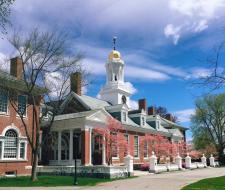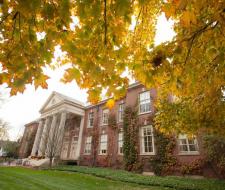Study history in USA - 162 institutions
- High School - Preparation for Historical Education in America
- Undergraduate History in America: TOP Universities and amission conditions for foreign students
- Prestigious Master's Degrees in History at TOP US Universities
- Doctoral studies for foreign students in the USA
- Post-Doctoral Research, Historical Internship Education in the USA
-
 Students are accepted to top-100 universities
Students are accepted to top-100 universities USALos Angeles, CaliforniaCurrently watching: 6from 75800.00 $ / year
USALos Angeles, CaliforniaCurrently watching: 6from 75800.00 $ / year -
 One of the most selective schools in the USA
One of the most selective schools in the USA USABoston, MassachusettsCurrently watching: 8from 61950.00 $ / year
USABoston, MassachusettsCurrently watching: 8from 61950.00 $ / year -
 By far the best school in Texas, outstanding facilities and accommodation
By far the best school in Texas, outstanding facilities and accommodation USAHouston, TexasCurrently watching: 7from 25225.00 $ / year
USAHouston, TexasCurrently watching: 7from 25225.00 $ / year -
 94% of graduates successfully enroll universities, including Ivy League universities
94% of graduates successfully enroll universities, including Ivy League universities USAMiami, FloridaCurrently watching: 7from 28680.00 $ / year
USAMiami, FloridaCurrently watching: 7from 28680.00 $ / year -
 from 62810.00 $ / year
from 62810.00 $ / year -
 from 29130.00 $ / semester
from 29130.00 $ / semester -
 from 23000.00 $ / year
from 23000.00 $ / year -
 According to information for 2019, 78% of graduates received grades 5-4 for AP subjects
According to information for 2019, 78% of graduates received grades 5-4 for AP subjects USABoston, MassachusettsCurrently watching: 6from 58714.00 $ / year
USABoston, MassachusettsCurrently watching: 6from 58714.00 $ / year -
 According to information for 2019, an average SAT score made up 1410
According to information for 2019, an average SAT score made up 1410 USABoston, MassachusettsCurrently watching: 10from 64640.00 $ / year
USABoston, MassachusettsCurrently watching: 10from 64640.00 $ / year -
 from 30865.00 $ / semester
from 30865.00 $ / semester
The demand for foreign students of historical education in America decreased in the last decades of the 20th century in terms of doctoral studies - this is due to the emergence of a number of applied specialties related to history. But in recent years, the number of people wishing to become historians has increased again (as confirmed by the ratings of the most sought-after professions) - partly due to the tendency of large corporations to open their own historical departments.
You can get the best historical education in the United States on the basis of:
- Secondary schools – private and public (preparation for university)
- Universities and colleges at the levels of bachelor's, master's, doctoral studies.
Alternative destinations
High School - Preparation for Historical Education in America
Students usually make a choice in favour of historical education in America during grades 7-8, at the Junior high school / Middle School, when they are divided into three areas of education of different difficulty levels:
- General, offering lite programs with the basics of disciplines at an elementary level. This option is for schoolchildren who plan to choose working specialties.
- College-bound ( preparation for universities) . Schoolchildren study subjects more deeply, including American and world history.
- Advanced - for future historians this is the most preferred option. Pupils in an express course study disciplines in university programs, including world literature, European and American history. Many schools at the end of the year give students an opportunity to get university grades.
Foreign students have an opportunity to receive a basic historical education in America by enrolling in the Junior School (upon reaching 12-13 years old), High School Diploma (15-18 years old) and further continue their studies at a college or university. 3-4 years in an American school will free a foreign applicant from the year of study at the Foundation preparatory courses and will allow starting the student years on an equal footing with the Americans. American schools begin classes in September, but you need to submit an application and the necessary documents in 6 months to a year. To enter the United States High School, you must provide:
- Statements with grades for previous academic years 2-3 and for the current year (if the student enters during the year)
- Letters of recommendation from school teachers
- IELTS or TOEFL language test certificate
- Some schools require an SSAT ( SAT ) exam.
- Motivation letter
- Proof of payment of the registration fee.
Undergraduate History in America: TOP Universities and amission conditions for foreign students
Graduates of the best universities who have received a historical education in the USA are in demand by both private corporations and government agencies. For example, a history specialist position can be obtained at:
- United States Government Legislative, Legal Services
- US National Archives
- Presidential Libraries
- Center for Historical Research, etc.
A foreign applicant who wants to get a historical education in the USA at the undergraduate degree must meet certain requirements: have an A-level secondary education diploma, TOEFL language certificate (IELTS). The studying lasts 4 years - for the first 2 years students study general subjects, at the 3rd course the narrow specialization starts.
Students are assisted by a teacher-adviser + for foreign students they provide special mentors who, in addition to issues of academic education, help to solve problems with a visa. After graduation, students receive a degree of BA (Bachelor of Arts in History) or BS (Bachelor of Science in History); the cost of one academic year is $ 23,000, meals and accommodation are paid separately.
TOP University Studies in History in the USA:
|
Educational establishment |
Program |
|
Aquinas college |
Bachelor of History |
|
Colby-Sawyer College |
Bachelor of History |
|
Keuka college |
Political Science and History |
|
Eastern Mennonite University |
Bachelor in History and Social Studies |
|
North park university |
Bachelor of History. |
The main list of disciplinary courses included in historical education programs in the USA:
- American history
- World history
- Western history
- Historiciography
- History of Asia, Japan
- World war II
- Early modern europe
- The Middle Ages, etc.
Prestigious Master's Degrees in History at TOP US Universities
For foreign students, graduate studies in the United States mean a guarantee of successful employment in prestigious government organizations and private corporations. According to statistics, the most popular city where you can get a quality historical education at local universities is New York and Florida. Duration of study - 1-2 years, cost - $ 17572 / year, rent is paid separately - about $ 5400, food - on average about $ 500-600, communication and transportation costs - $ 170-250. Documents for admission to candidates must be prepared at least six months before the start of studies - the main requirements:
- Higher education - Bachelor's degree (local or native country)
- Extract from the diploma with grades in all passed disciplines
- TOEFL Language Test Results
- GRE results for testing analytical thinking, logic, and ability to find solutions
- Motivation letter.
Some popular historical education programs in the USA :
|
University |
Program |
|
Alabama State University |
Master of Education (M.Ed.) in History |
|
Alabama State University the Harold Lloyd Murthy Graduate School |
Master of Education (MED / ALTA) History |
|
Youngstown state university (ysu) |
MA in Applied History |
|
Hawai'i Pacific University |
MA History |
Doctoral studies for foreign students in the USA
The third stage in obtaining a historical education in the USA is postgraduate study. There are faculties of history at the postgraduate level at the best US universities: any foreign student with a Master's degree can enter there. Studying lasts 4-6 years, the period depends on the requirements of the university and the form of the study - full-time in person or with a partial visit on mandatory attendance days. Studying includes two cycles - 3-4 semesters of theory in the audience, then writing and defending a dissertation with the help of an appointed supervisor. To enter the US graduate school, you need a master's degree. American graduate school provides several possible research degrees in the historical direction:
- PhD - Ph.D.
- EdD - Doctor of Education (for teaching).
Post-Doctoral Research, Historical Internship Education in the USA
Another phase of historical science education in the United States is Post-Doctoral Research, an internship for current PhDs for research. To be able to travel, you need to contact American universities, on the basis of which there are graduate schools in the historical direction. Many of them work under partnership agreements with large international and local organizations, corporations that are ready to accept young candidates of science. Such novice scientists who replenish their research experience are called post-docs - they can formally be part of the Staff, a team of employees, and receive a salary of about $ 35,000 / year.
